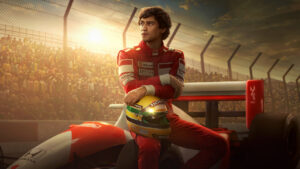Senna, a new Netflix series, would instantly earn at least two additional stars if no one spoke. However, every time one of its fragile characters speaks, you’ll feel compelled to pause and pump the breaks or revisit the groundbreaking documentary by Asif Kapadia. Based on the life and career of the renowned Brazilian Formula One racer Ayrton Senna, the six-part historical drama needs to be more exciting, bland, and egregious. It is arguably the least successful method to honour his remarkable career and enduring impact.
A sort of storytelling that can only be characterised as Kabir Khan-coded undermines the program, which stars Gabriel Leone, who, incidentally, has previously portrayed a killed racing car driver once before — he had a noteworthy supporting part in Michael Mann’s Ferrari. In a matter of minutes, Ayrton goes from playing pretend racing cars as a kid to taking home go-kart titles; his talent and enthusiasm are undeniable. He is essentially unstoppable; he outsmarts, outmanoeuvres, and outperforms opponents who dare to stand in his way. What a drab method of drama.
Teenage Ayrton is sent to the UK with his parents unwavering backing, where he creates waves on the Formula Ford track and attracts the interest of F1 “principals.” He gets signed right away by a squad named Toleman, where he places on many podiums throughout his rookie campaign. The first few episodes have an indisciplined and inefficient narrative. The authors are skimming the beats rather than pausing for emotionally charged passages. It’s not that there are too many in the first place. For example, Ayrton’s childhood sweetheart is presented and discarded in around thirty minutes. They get married and get divorced throughout this period. Ignore the psychological effects this had on Ayrton; the program sees this period of his life as merely a bump on the road.

It allows local language producers to work with relative freedom. The numerous examples of crossover hits show that Netflix’s foreign content has been growing. However, Senna’s writing is so childish that even an essential exchange might frequently resemble two persons speaking to each other through Google Translate. All of the characters, including Aryton, use exposition when speaking. During a challenging race, one character exclaims, “That bloody idiot’s going over 100 miles per hour on a track he doesn’t know.” Another figure confronts Ayrton, saying, “You are the fastest driver in Formula One history.” The most amusing part is when a lady he meets up with after his divorce gets out of bed, looks into space, and remarks, “Three out of three people down there think they’re royalty.” You must behave like a king to assert your position here. Ayrton responds, “I think it’s going to rain,” as there is a thunderclap. He is not implying a metaphor.
It hurts to see. Furthermore, things don’t get any better with time. As Ayrton’s career accomplishments precede his personal life, showrunner Vicente Amorim intensifies this approach. Fans of the racer are already aware of the high points of his career, and the presentation diligently and robotically crosses off each event. We see his superb driving in Portugal’s wet conditions; he pushes his McLaren to the limit in Monaco, and we instinctively support him when a rivalry breaks out between him and his colleague, Alain Prost. The Frenchman’s only goal is to discreetly look at Ayrton in various contexts before complaining about him to Jean-Marie Balestre, the head of FISA.
These are entirely two-dimensional figures. Balestre wants to retire from racing, but Prost intends to beat him on the track. They act a certain way because the production requires it, not because they are motivated to undermine him. One wonders how something as by-the-numbers as this got approved in the first place, and there needs to be more information on the page. Even Daniel Day-Lewis would have required help polishing this material. Therefore, it would be wrong to place the fault on the performers. Leone’s failure was predetermined. Like a youngster pleading with their mother to let them spend an additional hour outside, he conveys the same sincere hope in each line.
Netflix viewed some pre-viz videos of the racing scenes. Senna’s races, which draw heavily on Ron Howard’s Rush’s stylised action, almost save the show but fall short. They are lively, thrilling, and, in contrast to the other series, simple to follow. The cinematography is striking, and the editing is melodious. You genuinely care about the result. Another group of filmmakers has created the action, which veers between realistic and computer-generated with unexpected fluidity. Senna might have merited a recommendation if the drama surrounding these scenes had been even more captivating. However, it is one of the least well-known Netflix series of the year.

